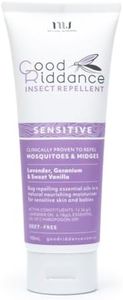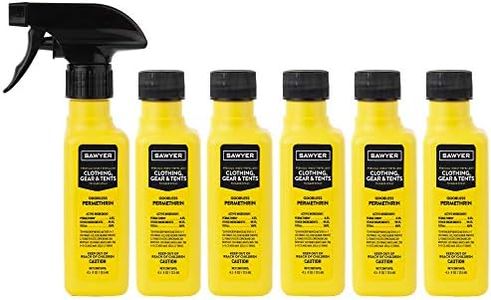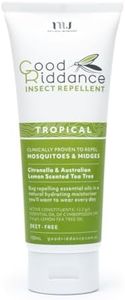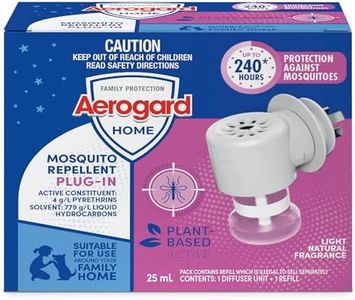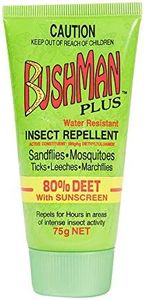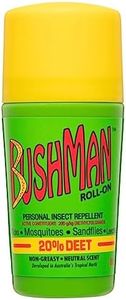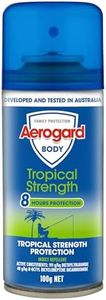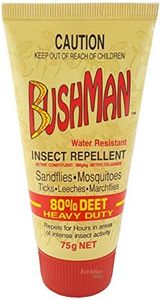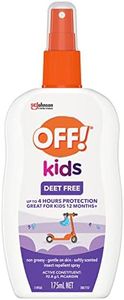We Use CookiesWe use cookies to enhance the security, performance,
functionality and for analytical and promotional activities. By continuing to browse this site you
are agreeing to our privacy policy
10 Best Insect Repellent For Africa
From leading brands and best sellers available on the web.By clicking on a link to a third party's website, log data is shared with that third party.
Buying Guide for the Best Insect Repellent For Africa
Choosing the right insect repellent is important, especially when traveling to areas where insects can carry diseases like malaria or dengue fever. The right product will protect you from bites and potential illnesses, improving your comfort and safety. It's important to look beyond just the brand name and understand what active ingredients and features suit your needs and specific destination.Active IngredientThe active ingredient is the main substance in the repellent that works to keep insects away. Common active ingredients include DEET, picaridin, IR3535, and oil of lemon eucalyptus. DEET is widely used and known for strong, long-lasting protection, often required in higher-risk mosquito areas. Picaridin is another effective option and tends to be less irritating to the skin, while IR3535 and oil of lemon eucalyptus are found in more natural or sensitive-skin formulations but may offer shorter duration or slightly less effectiveness. When choosing, consider your skin sensitivity, the risk level in your destination, and personal preference for synthetic versus more natural ingredients.
ConcentrationConcentration refers to how much of the active ingredient is present in the repellent, usually measured as a percentage. For DEET, concentrations ranging from 20% to 50% provide several hours of protection and are recommended for high-risk areas like many African regions. Lower concentrations (under 20%) can be enough for short outings or low-risk locations but won’t last as long. Higher concentration does not always mean better; it mostly means longer-lasting protection. Select a concentration based on how long you’ll be exposed before you can reapply, and your tolerance for stronger formulations.
Formulation TypeFormulation type means the physical form of the repellent—like sprays, lotions, aerosols, wipes, or sticks. Sprays are convenient for applying to both skin and clothing and are easy to use on the go. Lotions offer more controlled, even application and can be better for sensitive skin. Wipes are handy for packing and fast use, while sticks are mess-free but may not cover large areas as quickly. Think about your activities: if you’ll need quick reapplication or will share with others, sprays and wipes might be best; for all-over body application, lotions could be more thorough.
Duration of ProtectionThis describes how long the repellent remains effective after you put it on. The expected time is usually listed on the product and relates to both the active ingredient and its concentration. In areas with a lot of insects or when you’ll be outdoors for long periods, a product promising longer protection can reduce the need for frequent reapplication. If you’re just taking short walks or staying indoors mostly, shorter-duration products may suffice. Your need for uninterrupted protection should guide your choice here.
Suitability for Children and Sensitive SkinNot all repellents are suitable for everyone, especially young children or people with sensitive skin. Some ingredients, like high-concentration DEET, may not be recommended for kids or for application near eyes and mouth. Always check the product’s label for age recommendations and skin safety, and opt for milder formulas for vulnerable skin. If you’re buying for a family or anyone with skin sensitivities, make sure the chosen product is appropriate for those users.
Water and Sweat ResistanceWater and sweat resistance means the product will continue to work even if you are sweating a lot or get wet, for example, if you are hiking, in hot climates, or swimming. Not all repellents will remain effective after exposure to water, so if your activities will have you sweating or near water, pick a repellent that advertises water- or sweat-resistance. This way, you stay protected without needing to reapply constantly.
Additional Features (Scent, Residue, Clothing Application)Some repellents have added features, such as pleasant scents, low residue, or are safe for application on clothing and gear. If you are sensitive to strong smells, or don’t want greasy or sticky skin, consider these aspects. Products safe for use on clothes can also help prevent bites through thin fabric. Your comfort and convenience, along with the environment you'll be in, should guide your consideration of these features.
